-
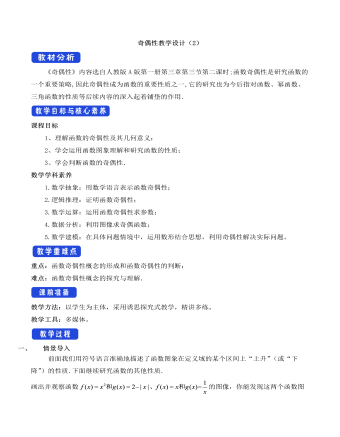
人教A版高中数学必修一奇偶性教学设计(2)
《奇偶性》内容选自人教版A版第一册第三章第三节第二课时;函数奇偶性是研究函数的一个重要策略,因此奇偶性成为函数的重要性质之一,它的研究也为今后指对函数、幂函数、三角函数的性质等后续内容的深入起着铺垫的作用.课程目标1、理解函数的奇偶性及其几何意义;2、学会运用函数图象理解和研究函数的性质;3、学会判断函数的奇偶性.数学学科素养1.数学抽象:用数学语言表示函数奇偶性;2.逻辑推理:证明函数奇偶性;3.数学运算:运用函数奇偶性求参数;4.数据分析:利用图像求奇偶函数;5.数学建模:在具体问题情境中,运用数形结合思想,利用奇偶性解决实际问题。重点:函数奇偶性概念的形成和函数奇偶性的判断;难点:函数奇偶性概念的探究与理解.教学方法:以学生为主体,采用诱思探究式教学,精讲多练。

人教A版高中数学必修一基本不等式教学设计(2)
《基本不等式》在人教A版高中数学第一册第二章第2节,本节课的内容是基本不等式的形式以及推导和证明过程。本章一直在研究不等式的相关问题,对于本节课的知识点有了很好的铺垫作用。同时本节课的内容也是之后基本不等式应用的必要基础。课程目标1.掌握基本不等式的形式以及推导过程,会用基本不等式解决简单问题。2.经历基本不等式的推导与证明过程,提升逻辑推理能力。3.在猜想论证的过程中,体会数学的严谨性。数学学科素养1.数学抽象:基本不等式的形式以及推导过程;2.逻辑推理:基本不等式的证明;3.数学运算:利用基本不等式求最值;4.数据分析:利用基本不等式解决实际问题;5.数学建模:利用函数的思想和基本不等式解决实际问题,提升学生的逻辑推理能力。重点:基本不等式的形成以及推导过程和利用基本不等式求最值;难点:基本不等式的推导以及证明过程.

人教A版高中数学必修二简单随机抽样教学设计
知识探究(一):普查与抽查像人口普查这样,对每一个调查调查对象都进行调查的方法,称为全面调查(又称普查)。 在一个调查中,我们把调查对象的全体称为总体,组成总体的每一个调查对象称为个体。为了强调调查目的,也可以把调查对象的某些指标的全体作为总体,每一个调查对象的相应指标作为个体。问题二:除了普查,还有其他的调查方法吗?由于人口普查需要花费巨大的财力、物力,因而不宜经常进行。为了及时掌握全国人口变动状况,我国每年还会进行一次人口变动情况的调查,根据抽取的居民情况来推断总体的人口变动情况。像这样,根据一定目的,从总体中抽取一部分个体进行调查,并以此为依据对总体的情况作出估计和判断的方法,称为抽样调查(或称抽查)。我们把从总体中抽取的那部分个体称为样本,样本中包含的个体数称为样本量。
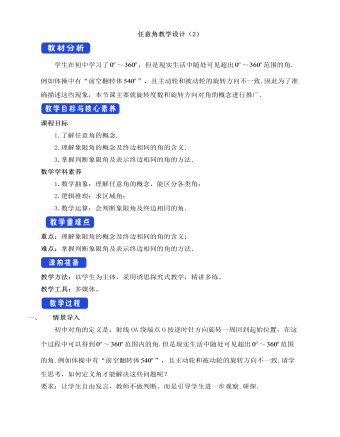
人教A版高中数学必修一任意角教学设计(2)
学生在初中学习了 ~ ,但是现实生活中随处可见超出 ~ 范围的角.例如体操中有“前空翻转体 ”,且主动轮和被动轮的旋转方向不一致.因此为了准确描述这些现象,本节课主要就旋转度数和旋转方向对角的概念进行推广.课程目标1.了解任意角的概念.2.理解象限角的概念及终边相同的角的含义.3.掌握判断象限角及表示终边相同的角的方法.数学学科素养1.数学抽象:理解任意角的概念,能区分各类角;2.逻辑推理:求区域角;3.数学运算:会判断象限角及终边相同的角.重点:理解象限角的概念及终边相同的角的含义;难点:掌握判断象限角及表示终边相同的角的方法.教学方法:以学生为主体,采用诱思探究式教学,精讲多练。教学工具:多媒体。一、 情景导入初中对角的定义是:射线OA绕端点O按逆时针方向旋转一周回到起始位置,在这个过程中可以得到 ~ 范围内的角.但是现实生活中随处可见超出 ~ 范围的角.例如体操中有“前空翻转体 ”,且主动轮和被动轮的旋转方向不一致.

人教A版高中数学必修一诱导公式教学设计(2)
本节主要内容是三角函数的诱导公式中的公式二至公式六,其推导过程中涉及到对称变换,充分体现对称变换思想在数学中的应用,在练习中加以应用,让学生进一步体会 的任意性;综合六组诱导公式总结出记忆诱导公式的口诀:“奇变偶不变,符号看象限”,了解从特殊到一般的数学思想的探究过程,培养学生用联系、变化的辩证唯物主义观点去分析问题的能力。诱导公式在三角函数化简、求值中具有非常重要的工具作用,要求学生能熟练的掌握和应用。课程目标1.借助单位圆,推导出正弦、余弦第二、三、四、五、六组的诱导公式,能正确运用诱导公式将任意角的三角函数化为锐角的三角函数,并解决有关三角函数求值、化简和恒等式证明问题2.通过公式的应用,了解未知到已知、复杂到简单的转化过程,培养学生的化归思想,以及信息加工能力、运算推理能力、分析问题和解决问题的能力。
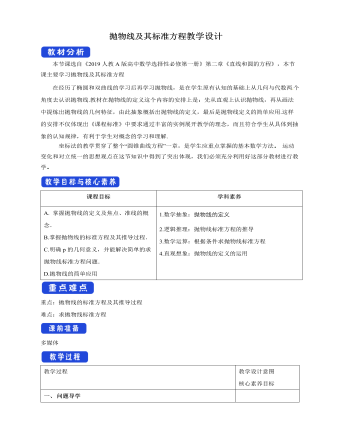
抛物线及其标准方程教学设计人教A版高中数学选择性必修第一册
本节课选自《2019人教A版高中数学选择性必修第一册》第二章《直线和圆的方程》,本节课主要学习抛物线及其标准方程在经历了椭圆和双曲线的学习后再学习抛物线,是在学生原有认知的基础上从几何与代数两 个角度去认识抛物线.教材在抛物线的定义这个内容的安排上是:先从直观上认识抛物线,再从画法中提炼出抛物线的几何特征,由此抽象概括出抛物线的定义,最后是抛物线定义的简单应用.这样的安排不仅体现出《课程标准》中要求通过丰富的实例展开教学的理念,而且符合学生从具体到抽象的认知规律,有利于学生对概念的学习和理解.坐标法的教学贯穿了整个“圆锥曲线方程”一章,是学生应重点掌握的基本数学方法 运动变化和对立统一的思想观点在这节知识中得到了突出体现,我们必须充分利用好这部分教材进行教学
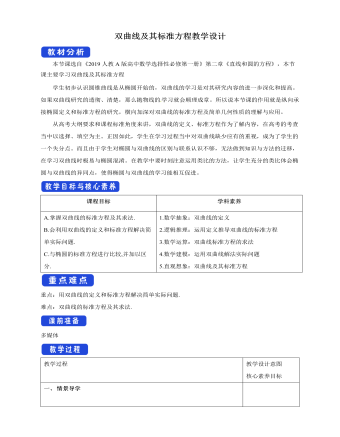
双曲线及其标准方程教学设计人教A版高中数学选择性必修第一册
∵在△EFP中,|EF|=2c,EF上的高为点P的纵坐标,∴S△EFP=4/3c2=12,∴c=3,即P点坐标为(5,4).由两点间的距离公式|PE|=√("(" 5+3")" ^2+4^2 )=4√5,|PF|=√("(" 5"-" 3")" ^2+4^2 )=2√5,∴a=√5.又b2=c2-a2=4,故所求双曲线的方程为x^2/5-y^2/4=1.5.求适合下列条件的双曲线的标准方程.(1)两个焦点的坐标分别是(-5,0),(5,0),双曲线上的点与两焦点的距离之差的绝对值等于8;(2)以椭圆x^2/8+y^2/5=1长轴的端点为焦点,且经过点(3,√10);(3)a=b,经过点(3,-1).解:(1)由双曲线的定义知,2a=8,所以a=4,又知焦点在x轴上,且c=5,所以b2=c2-a2=25-16=9,所以双曲线的标准方程为x^2/16-y^2/9=1.(2)由题意得,双曲线的焦点在x轴上,且c=2√2.设双曲线的标准方程为x^2/a^2 -y^2/b^2 =1(a>0,b>0),则有a2+b2=c2=8,9/a^2 -10/b^2 =1,解得a2=3,b2=5.故所求双曲线的标准方程为x^2/3-y^2/5=1.(3)当焦点在x轴上时,可设双曲线方程为x2-y2=a2,将点(3,-1)代入,得32-(-1)2=a2,所以a2=b2=8.因此,所求的双曲线的标准方程为x^2/8-y^2/8=1.当焦点在y轴上时,可设双曲线方程为y2-x2=a2,将点(3,-1)代入,得(-1)2-32=a2,a2=-8,不可能,所以焦点不可能在y轴上.综上,所求双曲线的标准方程为x^2/8-y^2/8=1.
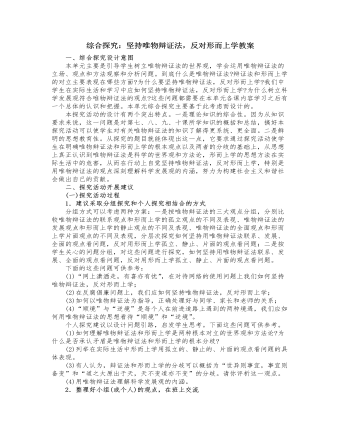
人教版高中政治必修4综合探究:坚持唯物辩证法,反对形而上学教案
5.循环经济当前,发展循环经济和知识经济已成为国际社会的两大趋势,有的发达国家甚至以立法的方式加以推进。循环经济本质上是一种生态经济,它要求运用生态学规律而不是机械的规律来指导人类社会的经济活动,减量化、再利用和资源化是其三大原则。传统经济是一种“资源——产品——污染排放”单向流动的线性经济,特征是高开采、低利用、高排放;与之不同,循环经济倡导的是一种与环境和谐的经济发展模式,它要求把经济活动组织成一个“资源——产品——再生资源”的反馈式流程,特征是低开采、高利用、低排放。目前,我国已经把发展循环经济作为编制“十一五”规划的重要指导原则。6.当心被优势“绊倒”有三个旅行者同时住进一家旅店,早上同时出门旅游。晚上归来时,拿伞的人淋得浑身是水,拿拐杖的人跌得满身是伤,而什么也没有带的人却安然无恙。
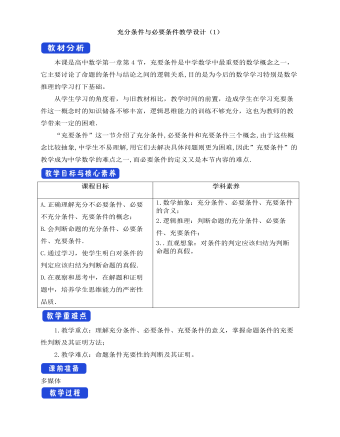
人教A版高中数学必修一充分条件与必要条件教学设计(1)
本课是高中数学第一章第4节,充要条件是中学数学中最重要的数学概念之一, 它主要讨论了命题的条件与结论之间的逻辑关系,目的是为今后的数学学习特别是数学推理的学习打下基础。从学生学习的角度看,与旧教材相比,教学时间的前置,造成学生在学习充要条件这一概念时的知识储备不够丰富,逻辑思维能力的训练不够充分,这也为教师的教学带来一定的困难.“充要条件”这一节介绍了充分条件,必要条件和充要条件三个概念,由于这些概念比较抽象,中学生不易理解,用它们去解决具体问题则更为困难,因此”充要条件”的教学成为中学数学的难点之一,而必要条件的定义又是本节内容的难点.A.正确理解充分不必要条件、必要不充分条件、充要条件的概念;B.会判断命题的充分条件、必要条件、充要条件.C.通过学习,使学生明白对条件的判定应该归结为判断命题的真假.D.在观察和思考中,在解题和证明题中,培养学生思维能力的严密性品质.
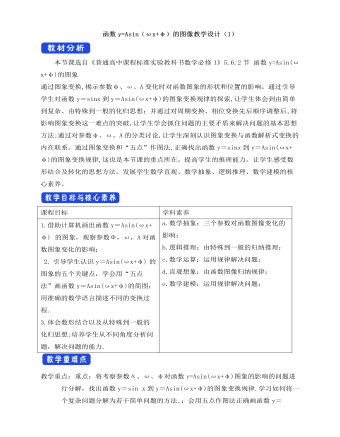
人教A版高中数学必修一函数y=Asin(ωχ+φ)教学设计(1)
本节课选自《普通高中课程标准实验教科书数学必修1》5.6.2节 函数y=Asin(ωx+φ)的图象通过图象变换,揭示参数φ、ω、A变化时对函数图象的形状和位置的影响。通过引导学生对函数y=sinx到y=Asin(ωx+φ)的图象变换规律的探索,让学生体会到由简单到复杂、由特殊到一般的化归思想;并通过对周期变换、相位变换先后顺序调整后,将影响图象变换这一难点的突破,让学生学会抓住问题的主要矛盾来解决问题的基本思想方法;通过对参数φ、ω、A的分类讨论,让学生深刻认识图象变换与函数解析式变换的内在联系。通过图象变换和“五点”作图法,正确找出函数y=sinx到y=Asin(ωx+φ)的图象变换规律,这也是本节课的重点所在。提高学生的推理能力。让学生感受数形结合及转化的思想方法。发展学生数学直观、数学抽象、逻辑推理、数学建模的核心素养。
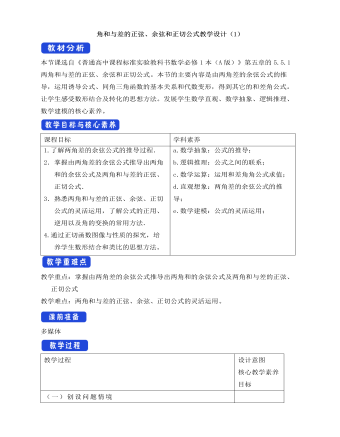
人教A版高中数学必修一两角和与差的正弦、余弦和正切公式教学设计(1)
本节课选自《普通高中课程标准实验教科书数学必修1本(A版)》第五章的5.5.1 两角和与差的正弦、余弦和正切公式。本节的主要内容是由两角差的余弦公式的推导,运用诱导公式、同角三角函数的基本关系和代数变形,得到其它的和差角公式。让学生感受数形结合及转化的思想方法。发展学生数学直观、数学抽象、逻辑推理、数学建模的核心素养。课程目标 学科素养1.了解两角差的余弦公式的推导过程.2.掌握由两角差的余弦公式推导出两角和的余弦公式及两角和与差的正弦、正切公式.3.熟悉两角和与差的正弦、余弦、正切公式的灵活运用,了解公式的正用、逆用以及角的变换的常用方法.4.通过正切函数图像与性质的探究,培养学生数形结合和类比的思想方法。 a.数学抽象:公式的推导;b.逻辑推理:公式之间的联系;c.数学运算:运用和差角角公式求值;d.直观想象:两角差的余弦公式的推导;e.数学建模:公式的灵活运用;
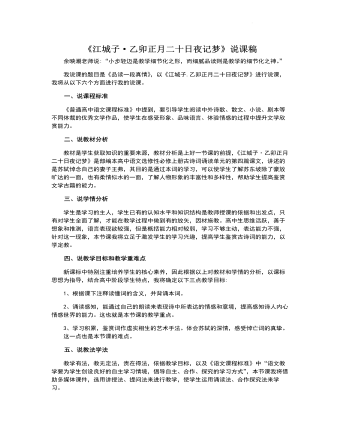
《江城子·乙卯正月二十日夜记梦》说课稿 2022-2023学年统编版高中语文选择性必修上册
一、温故导入好的导入未成曲调先有情,可以取得事半功信的教学效果。对于本节课我以温故知新的方式导入,以苏轼的《赤壁赋》和《念奴娇》引导学生感受苏轼的豪放和阔达,从学生熟悉领域出发,引导学生探究他内心深处的“柔情似水”,感受他的“十年生死”之梦。二、诵读感知(亮点一)《语文课程标准》中建议“教师要充分关注学生阅读需求的多样性,阅读心理的独特性”。所以在本环节我将综合运用听、读、问、答四种方式教学。首先通过多媒体听读,激发学生学习兴趣,直观感受苏轼的痛彻心扉和伤心欲绝。其次指定学生诵读,并在诵读之后,由学生点评,加深学生对于断句、轻重、快慢的理解,进一步感受本词的凄苦哀怨。最后配乐读,利用凄清的音乐引导学生通过自己的诵读来表现诗中所蕴含的真挚之感。设计意图:通过多种阅读方法,反复阅读本词,引导学生由浅入深的理解本词的思想内容和艺术风格,初步感受作者对妻子的挚爱之情和他的痛彻心扉,加深学生对文章的理解。
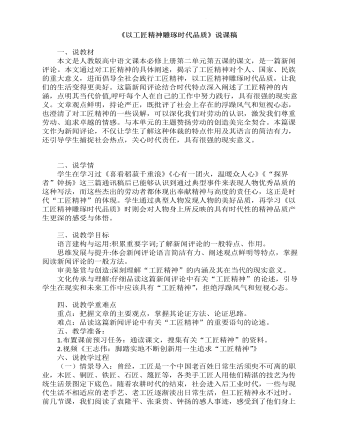
《以工匠精神雕琢时代品质》说课稿 2022-2023学年统编版高中语文必修上册
答案:铜车马的辉煌,来自原料的精挑细选、工艺的精巧极致和工匠的精心雕琢。可以说,是精益求精的工匠精神锻造出了“青铜之冠”的铜车马。2.“工匠精神”如此重要,那么,你认为“工匠精神”有着怎样的现实意义?观点一:工匠精神在企业层面,可以认为是企业精神。具体而言,表现在以下几个方面。第一,创新是企业不断发展的精神内核。第二,敬业是企业领导者精神的动力。第三,执着是企业走得长久的底气。改革开放40 多年来,我国涌现出大批有工匠精神的企业,但也有一些企业缺乏企业精神,只追求“短平快”的经济效益。这正是经济发展的隐忧所在。观点二:工匠精神在员工层面,就是一-种认真精神、敬业精神。其核心是: 不仅仅把工作当作赚钱养家糊口的工具,而是树立起对职业敬畏、对工作执着、对产品负责的态度,极度注重细节,不断追求完美和极致,给客户无可挑剔的体验。我国制造业存在大而不强、产品档次整体不高、自主创新能力较弱等现象,多少与工匠精神稀缺、“差不多精神”有关。

古诗词诵读《拟行路难(其四)》说课稿 2021-2022学年统编版高中语文选择性必修下册
(一)导入新课“时势造英雄”,恶劣的环境造就名诗名篇。正因如此,怀才不遇于古人是恒久的情感素材。同学们,请大家回忆我们学过哪些抒发作者怀才不遇的诗词?(二)解释题意拟:仿照,模拟《行路难》,是乐府杂曲,本为汉代歌谣,晋人袁山松改变其音调,创制新词,流行一时。 鲍照《拟行路难》共十八首,歌咏人世的种种忧虑,寄寓悲愤,今天我们学习的是其中第四首。(三)作者简介、写作背景门阀制度之下,“上品无寒门,下品无世族”,出身寒微的文人往往空怀一腔热忱,却报国无门,不得不在壮志未酬的遗恨中坐视时光流逝。即使跻身仕途,也多是充当幕僚、府掾,备受压抑,在困顿坎坷中徒然挣扎,只落得身心交瘁。
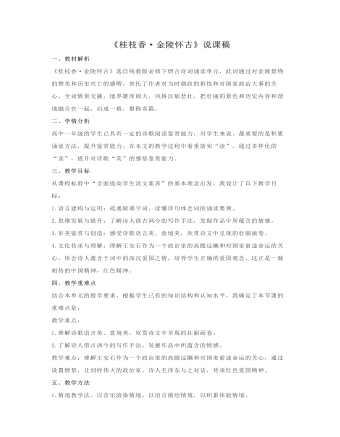
古诗词诵读《桂枝香?金陵怀古》说课稿(二) 2021-2022学年统编版高中语文必修下册
一、教材解析《桂枝香·金陵怀古》选自统教版必修下册古诗词诵读单元,此词通过对金陵景物的赞美和历史兴亡的感喟,寄托了作者对当时朝政的担忧和对国家政治大事的关心。全词情景交融,境界雄浑阔大,风格沉郁悲壮,把壮丽的景色和历史内容和谐地融合在一起,自成一格,堪称名篇。二、学情分析高中一年级的学生已具有一定的诗歌阅读鉴赏能力,对学生来说,最重要的是积累诵读方法,提升鉴赏能力。在本文的教学过程中着重落实“读”,通过多样化的“读”,提升对诗歌“美”的感悟鉴赏能力。三、教学目标从课程标准中“全面提高学生语文素养”的基本理念出发,我设计了以下教学目标:1.语言建构与运用:疏通疑难字词,读懂诗句体会词的诵读要领。
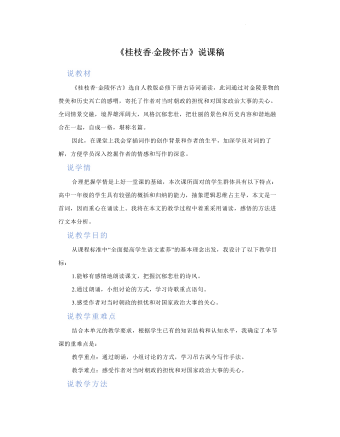
古诗词诵读《桂枝香?金陵怀古》说课稿(一) 2021-2022学年统编版高中语文必修下册
王安石,字介甫,号半山。北宋著名政治家、思想家、文学家、改革家,唐宋八大家之一。欧阳修称赞王安石:“翰林风月三千首,吏部文章二百年。老去自怜心尚在,后来谁与子争先。”传世文集有《王临川集》、《临川集拾遗》等。其诗文各体兼擅,词虽不多,但亦擅长,世人哄传之诗句莫过于《泊船瓜洲》中的“春风又绿江南岸,明月何时照我还。”且有名作《桂枝香》等。介绍之后设置这样的导入语:今天我们共同走进王安石,一起欣赏名作《桂枝香·金陵怀古》。(板书标题)(二)整体感知整体感知是赏析文章的前提,通过初读,可以使学生初步了解将要学到的基本内容,了解文章大意及思想意图,使学生对课文内容形成整体感知。首先,我会让学生根据课前预习,出声诵读课文,同时注意朗读的快慢、停顿、语调、轻重音等,然后再播放音频,纠正他们的读音与停顿。其次,我会引导学生谈谈他感受。学生通过朗读,能够说出本词雄壮、豪放、有气势,有对景物的赞美和对历史的感喟。
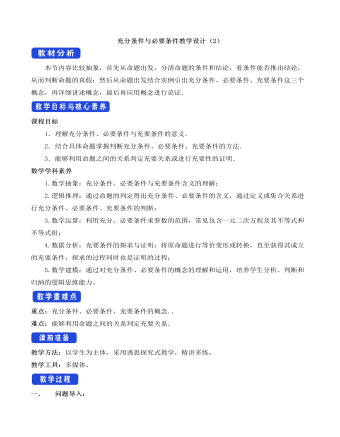
人教A版高中数学必修一充分条件与必要条件教学设计(2)
【例3】本例中“p是q的充分不必要条件”改为“p是q的必要不充分条件”,其他条件不变,试求m的取值范围.【答案】见解析【解析】由x2-8x-20≤0得-2≤x≤10,由x2-2x+1-m2≤0(m>0)得1-m≤x≤1+m(m>0)因为p是q的必要不充分条件,所以q?p,且p?/q.则{x|1-m≤x≤1+m,m>0}?{x|-2≤x≤10}所以m>01-m≥-21+m≤10,解得0<m≤3.即m的取值范围是(0,3].解题技巧:(利用充分、必要、充分必要条件的关系求参数范围)(1)化简p、q两命题,(2)根据p与q的关系(充分、必要、充要条件)转化为集合间的关系,(3)利用集合间的关系建立不等关系,(4)求解参数范围.跟踪训练三3.已知P={x|a-4<x<a+4},Q={x|1<x<3},“x∈P”是“x∈Q”的必要条件,求实数a的取值范围.【答案】见解析【解析】因为“x∈P”是x∈Q的必要条件,所以Q?P.所以a-4≤1a+4≥3解得-1≤a≤5即a的取值范围是[-1,5].五、课堂小结让学生总结本节课所学主要知识及解题技巧
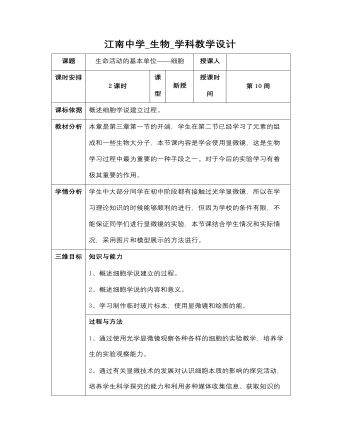
高中生物苏教版必修一《31生命活动及本单位-细胞》教案
本章是第三章第一节的开端,学生在第二节已经学习了元素的组成和一些生物大分子,本节课内容是学会使用显微镜,这是生物学习过程中最为重要的一种手段之一。对于今后的实验学习有着极其重要的作用。 学生中大部分同学在初中阶段都有接触过光学显微镜,所以在学习理论知识的时候能够顺利的进行,但因为学校的条件有限,不能保证同学们进行显微镜的实验,本节课结合学生情况和实际情况,采用图片和模型展示的方法进行。 知识与能力 1、概述细胞学说建立的过程。 2、概述细胞学说的内容和意义。 3、学习制作临时玻片标本,使用显微镜和绘图的能。
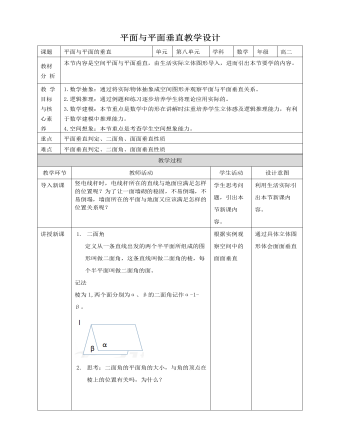
人教A版高中数学必修二平面与平面垂直教学设计
6. 例二:如图,AB是⊙O的直径,PA垂直于⊙O所在的平面,C是圆周上的一点,且PA=AC,求二面角P-BC-A的大小. 解:由已知PA⊥平面ABC,BC在平面ABC内∴PA⊥BC∵AB是⊙O的直径,且点C在圆周上,∴AC⊥BC又∵PA∩AC=A,PA,AC在平面PAC内,∴BC⊥平面PAC又PC在平面PAC内,∴PC⊥BC又∵BC是二面角P-BC-A的棱,∴∠PCA是二面角P-BC-A的平面角由PA=AC知△PAC是等腰直角三角形∴∠PCA=45°,即二面角P-BC-A的大小是45°7.面面垂直定义一般地,两个平面相交,如果它们所成的二面角是直二面角,就说这两个平面互相垂直,平面α与β垂直,记作α⊥β8. 探究:建筑工人在砌墙时,常用铅锤来检测所砌的墙面与地面是否垂直,如果系有铅锤的细绳紧贴墙面,工人师傅被认为墙面垂直于地面,否则他就认为墙面不垂直于地面,这种方法说明了什么道理?

人教A版高中数学必修一等式性质与不等式性质教学设计(2)
等式性质与不等式性质是高中数学的主要内容之一,在高中数学中占有重要地位,它是刻画现实世界中量与量之间关系的有效数学模型,在现实生活中有着广泛的应,有着重要的实际意义.同时等式性质与不等式性质也为学生以后顺利学习基本不等式起到重要的铺垫.课程目标1. 掌握等式性质与不等式性质以及推论,能够运用其解决简单的问题.2. 进一步掌握作差、作商、综合法等比较法比较实数的大小. 3. 通过教学培养学生合作交流的意识和大胆猜测、乐于探究的良好思维品质。数学学科素养1.数学抽象:不等式的基本性质;2.逻辑推理:不等式的证明;3.数学运算:比较多项式的大小及重要不等式的应用;4.数据分析:多项式的取值范围,许将单项式的范围之一求出,然后相加或相乘.(将减法转化为加法,将除法转化为乘法);5.数学建模:运用类比的思想有等式的基本性质猜测不等式的基本性质。